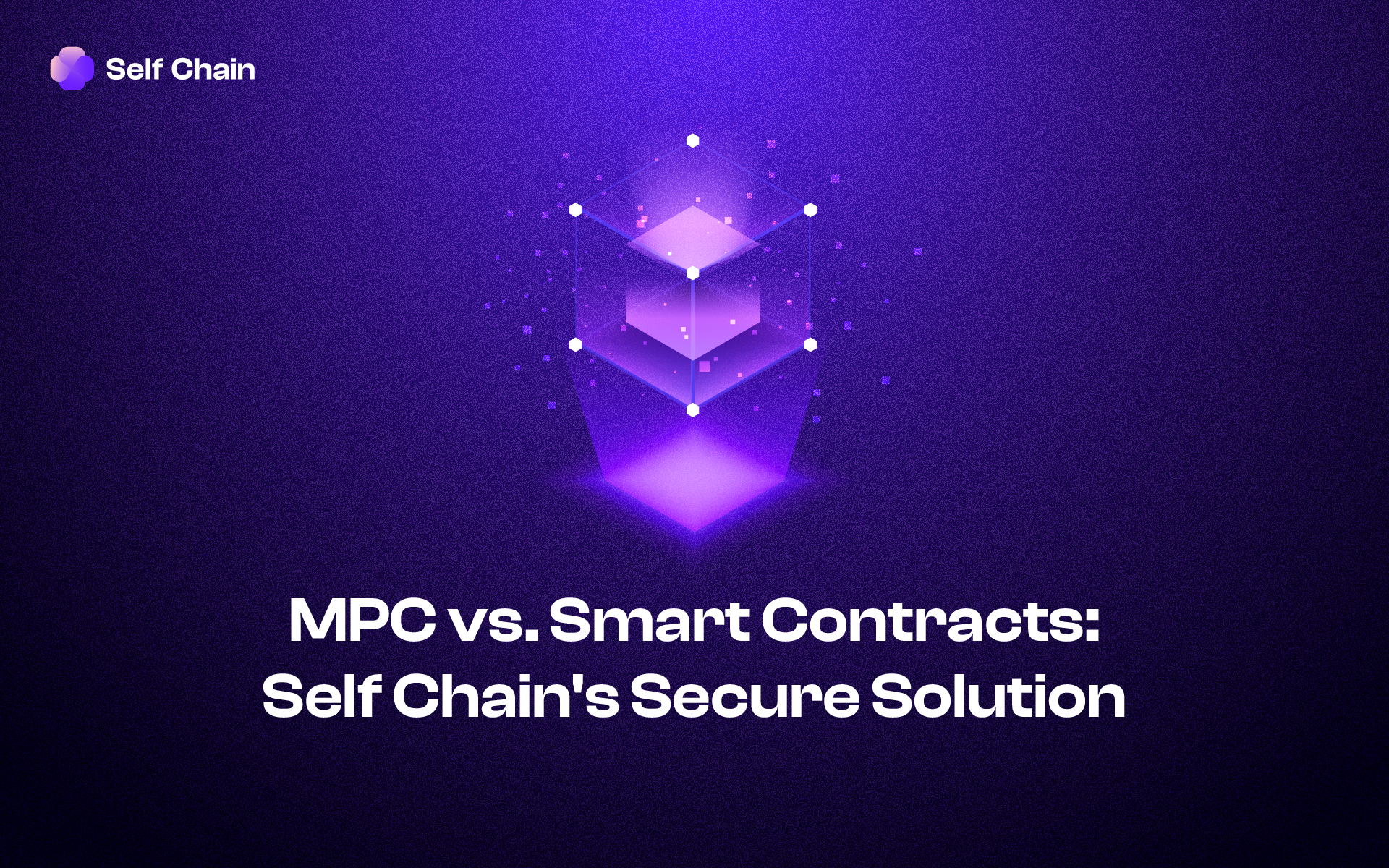MPC vs. Smart Contracts: Self Chain's Secure Solution
Self Chain pioneers keyless MPC wallets, balancing security, simplicity, and efficiency in digital finance.

The quest for secure and efficient digital asset management has led to significant innovations, particularly in Multi-party Computation (MPC) and Smart Contract technologies. While each technology offers unique advantages for digital asset management, it also comes with its own set of challenges. Enter Self Chain, a visionary in the digital finance space, pioneering a keyless wallet infrastructure that leverages MPC-TSS technology to address these challenges head-on.
The Distinct Worlds of MPC and Smart Contract Technologies
At its core, MPC technology focuses on enhancing transaction security by distributing control across multiple parties. This method significantly reduces the risk of a single point of failure, a critical consideration in the management of digital assets. However, the increased security comes with its own costs: complexity and computational demands can be substantial, potentially hindering wider adoption.
Smart Contract technology, on the other hand, brings automation and efficiency to the forefront. Contracts are executed automatically upon meeting predefined conditions, all within the transparent and immutable environment of the blockchain. This not only streamlines operations but also fosters trust through openness. Yet, this technology is not without its flaws—privacy can be compromised, and the immutable nature of smart contracts means any bugs or vulnerabilities are permanent fixtures.
Pros and Cons of MPC Wallets and Smart Contract Wallets
When comparing MPC wallets to Smart Contract wallets, the contrast in benefits and drawbacks is clear. MPC wallets offer a fortress of security and privacy but at the cost of user-friendliness and computational efficiency. Smart Contract wallets excel in automation and operational efficiency but struggle with privacy issues and the inability to amend once deployed.
MPC Wallets:
- Pros:
- Enhanced Security: By distributing the decision-making process and not storing a complete key in one location, MPC wallets significantly reduce the risk of theft or unauthorized access.
- Privacy: MPC allows for transactions and computations without revealing individual inputs, maintaining privacy among parties.
- Flexibility: They support a range of cryptographic operations and transactions without needing blockchain consensus mechanisms.
- Cons:
- Complexity: The underlying technology is complex, which can be a barrier to widespread adoption and understanding.
- Computationally Intensive: Secure MPC protocols can be resource-intensive, potentially leading to higher operational costs.
Smart Contract Wallets:
- Pros:
- Automation: Transactions and contracts are executed automatically based on code, reducing the need for intermediaries and potential human error.
- Transparency and Immutability: Being built on blockchain, they offer a transparent environment where once deployed, the contract cannot be altered.
- Interoperability: Easily interact with other contracts and services on the blockchain, facilitating complex operations and dApps.
- Cons:
- Limited Privacy: Transactions and contract details are visible on the blockchain, potentially exposing sensitive information.
- Immutable Bugs: If a smart contract contains bugs or vulnerabilities, these cannot be easily fixed once deployed, which can lead to security risks.
Self Chain: Pioneering a User-Friendly Future in Digital Finance
Self Chain's initiative is a game-changer in the realm of digital asset management.
Here's how Self Chain addresses these challenges:
- Optimized Infrastructure: Self Chain designs its infrastructure to optimize MPC wallet operations, minimizing the computational overhead required for secure transactions.
- Advanced Algorithms: Self Chain employs cutting-edge algorithms and protocols to enhance the efficiency of MPC operations, reducing the computational resources needed without compromising security.
- User-Friendly Interface: Self Chain prioritizes user experience, developing intuitive interfaces that simplify the interaction with MPC wallets, making them accessible to a broader audience.
- Continuous Optimization: Self Chain continuously refines its MPC wallet technology, incorporating feedback and advancements in MPC and TSS research to further streamline operations and reduce complexity.
By addressing the inherent difficulties associated with MPC wallets—complexity and computational intensity—Self Chain's infrastructure stands as a testament to the possibility of secure yet straightforward digital finance solutions. This not only paves the way for enhanced security and operational efficiency but also ensures a user-friendly experience that can foster wider adoption and trust in digital transactions.
As the digital finance landscape continues to expand and evolve, solutions like Self Chain's keyless wallets are crucial for a future where managing digital assets is both secure and accessible. With a keen eye on the horizon, Self Chain is not just addressing the present challenges but is also laying the groundwork for a more inclusive, efficient, and secure digital financial ecosystem.
About Self Chain
Self Chain is the first Modular Intent-Centric Access Layer1 blockchain and keyless wallet infrastructure service using MPC-TSS/AA for multi-chain Web3 access. The innovative system simplifies the user experience with its intent-focused approach, using LLM to interpret user intent and discover the most efficient paths.
Self Chain ensures that onboarding and recovery are effortless with keyless wallets that grant users complete self-custody over their assets. In addition, it provides automated rewards to dApps when they efficiently resolve user intent, further enhancing the user experience. Moreover, Self Chain incorporates Account Abstraction with MPC-TSS to provide secure signing and reduce transaction fees. It's a platform that redefines blockchain interaction, making it more secure and user-friendly for everyone.
In a world where blockchain technology is becoming increasingly essential, the user experience remains a critical factor in its adoption. Intents and Keyless Wallets are set to transform the landscape, making blockchain interactions more accessible, efficient, and secure. As we move forward, the blockchain industry has the opportunity to provide users with a seamless and enjoyable experience, unlocking the full potential of this groundbreaking technology.
